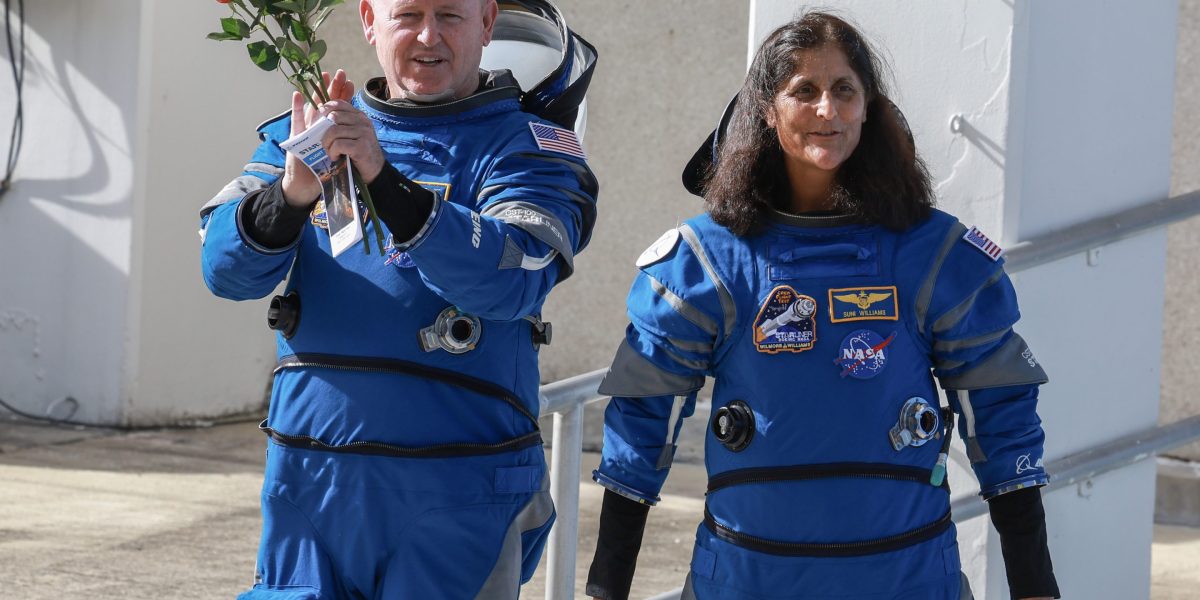After being stranded on the International Space Station since June, two astronaut castaways may still be months away from returning to Earth—in part because of incompatible spacesuits.
The two astronauts, Butch Wilmore and Suni Williams, have had to extend what was supposed to be an eight-day trip on the ISS, due to a helium leak and thruster malfunctions on their Boeing-made Starliner spacecraft. NASA and Boeing are testing to see if it’s safe for the astronauts to return on the Boeing Starliner, but are also considering alternatives because of the possible risks.
NASA has yet to make a decision, but one of those alternatives includes sending the astronauts home on a Dragon spacecraft, manufactured by Elon Musk’s SpaceX, that is already docked at the station, a representative from the space agency said during a press conference last week, Ars Technica reported.
Yet, that approach comes with complications, as explained by Swapna Krishna, the journalist behind the space-themed YouTube channel Ad Astra. If NASA chose that option, Wilmore and Williams would be the fifth and sixth astronauts on a spacecraft that’s limited to four passengers. And because their Starliner suits aren’t compatible with the Dragon spacecraft, they would have to return to Earth without suits on, which isn’t inherently dangerous, but offers them less protection in case something goes wrong with the capsule.
The differing suit designs and plugs for the Starliner and Dragon spacecrafts comes down to a new process for commercial crewed space missions that NASA has implemented. Previously, NASA was extremely involved in the manufacture and testing of spacecraft and spacesuits.
Yet, since the 2010s when NASA developed the commercial crew program, it has given private companies more freedom in how they develop and manufacture equipment for the agency, including spacesuits, as long as it meets broad safety requirements. For instance, NASA didn’t specify that spacesuits for each commercial spacecraft need to be cross compatible with each other. In fact, having two different suit designs for each spacecraft could also be beneficial, according to Krishna.
“If the suits used the same type of plug and some sort of flaw was found within that plug or some other sort of standardized connector, it would ground both spacecraft,” she said in a Sunday video.
A spokesperson for Boeing referred a request for comment to NASA. NASA and SpaceX did not immediately respond to requests for comment. NASA has said the astronauts are not “stranded” on the ISS.
Paul Hennessy—Anadolu via Getty Images
Another alternative is sending the astronauts home on a different Dragon spacecraft that’s set to reach the ISS in September. This ship could reach the space station with only two of its usual four crew members and could send up extra (Dragon-compatible) spacesuits, which would allow Wilmore and Williams to return to Earth fully suited in the two unfilled seats.
But if NASA chose this alternative, the Starliner ship that the astronauts originally flew in would have to undock and return to Earth autonomously to make room for the Dragon spacecraft arriving in September, and Boeing has said it might not be able to do that. Because of the way Boeing’s contract with NASA is structured, the company has had to absorb the extra costs associated with the technical failures of its Starliner. The company has already taken about $1.6 billion in charges on its Starliner program.
If the Starliner left the space station without a crew, the astronauts on the ISS would also have to install two extra seats on the remaining Dragon spacecraft until the next Dragon spaceship arrives, because there needs to be enough seats on the remaining docked ship to accommodate all the NASA astronauts in case of an emergency.
The marooned astronauts would also need to take the place of the two astronauts pulled from the Dragon mission to accommodate them, which would keep them aboard the ISS until the regular rotation ends in February 2025. That would mean turning what was supposed to be just over a week-long mission into eight months. Although both astronauts have completed longer missions on the ISS before, those were filled with less uncertainty. Wilmore’s wife told a CBS station in Knoxville, Tenn. that she is preparing for her husband to miss Christmas and the couple’s 30th wedding anniversary.

